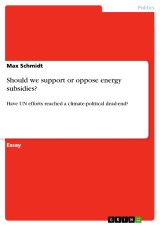Details

Should we support or oppose energy subsidies?
Have UN efforts reached a climate-political dead-end?1. Auflage
|
CHF 15.00 |
|
| Verlag: | Grin Verlag |
| Format: | |
| Veröffentl.: | 03.02.2021 |
| ISBN/EAN: | 9783346339430 |
| Sprache: | englisch |
| Anzahl Seiten: | 15 |
Dieses eBook erhalten Sie ohne Kopierschutz.
Beschreibungen
Essay from the year 2020 in the subject Politics - Environmental Policy, grade: 1.0, School of Oriental and African Studies, University of London (Center for International Studies and Diplomacy), course: Global Energy and Climate Policy, language: English, abstract: This essay will discuss the following questions: Should we support or oppose energy subsidies? After three decades, UN efforts to address climate change have reached a dead-end.
In this essay, it will be argued that firstly, from a conceptual viewpoint, energy subsidies (ES) must not be considered a monolith. Secondly, from a more empirical viewpoint, it becomes clear that most ES benefit particular interests more than supposedly global economic and climatic interests, making the case for the opposition of these ES, whether they are fossil fuel subsidies (FFS) or such for renewable energy sources (RES).
Firstly, as expressions of political will ES play different roles across time and national contexts and are anything but uniform. A widely accepted definition that includes both FFS and RES stems from the International Energy Agency (IEA 1999). It understands ES broadly as any government action that is directed primarily at the energy sector and lowers the cost of energy production, raises the price received by energy producers or lowers the price paid by energy consumers.
These and further specifications are crucial since the notion of ES tends to hide more than the merely quantitative distinctness between FFS and RES. More precisely, it can be assumed that ES are – to different extents – interrelated with the energy
trilemma as a central challenge for energy governance. This is since, depending on the respective national context, they might affect its three competing aims of environmental sustainability, economic competitiveness and energy security differently and are equally subject to their preference order.
In this essay, it will be argued that firstly, from a conceptual viewpoint, energy subsidies (ES) must not be considered a monolith. Secondly, from a more empirical viewpoint, it becomes clear that most ES benefit particular interests more than supposedly global economic and climatic interests, making the case for the opposition of these ES, whether they are fossil fuel subsidies (FFS) or such for renewable energy sources (RES).
Firstly, as expressions of political will ES play different roles across time and national contexts and are anything but uniform. A widely accepted definition that includes both FFS and RES stems from the International Energy Agency (IEA 1999). It understands ES broadly as any government action that is directed primarily at the energy sector and lowers the cost of energy production, raises the price received by energy producers or lowers the price paid by energy consumers.
These and further specifications are crucial since the notion of ES tends to hide more than the merely quantitative distinctness between FFS and RES. More precisely, it can be assumed that ES are – to different extents – interrelated with the energy
trilemma as a central challenge for energy governance. This is since, depending on the respective national context, they might affect its three competing aims of environmental sustainability, economic competitiveness and energy security differently and are equally subject to their preference order.
Diese Produkte könnten Sie auch interessieren:

How Insights from Moral Psychology and Character Research can aid Development Cooperation

von: Jan Prothmann

CHF 14.00
















